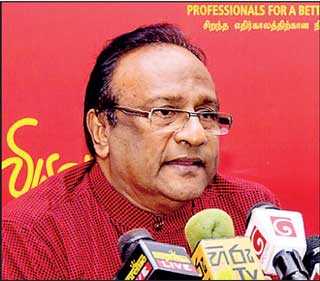Wednesday Feb 18, 2026
Wednesday Feb 18, 2026
Friday, 19 March 2021 00:00 - - {{hitsCtrl.values.hits}}
 |
| Minister for Public Security Sarath Weerasekara
|
People’s Rights Group (PRG), a rights-based advocacy and lobbying group based in the UK particularly dealing with human rights violations in Sri Lanka, notes with serious concern the continued harassment, targeting and demonisation of the Muslim community by the Government of Sri Lanka despite the
Government’s decision to allow for burial of COVID victims.
While partial relief has been granted to Muslim and Christian families to bury their loved ones, albeit at a designated site in remote village in the Eastern Province, a number of draconian measures and pronouncements that seriously violate the basic human rights of the community followed this partial relief.
On the same day that the Government allowed burials, an administrative announcement was made by the Deputy Director General of Customs that any Islamic religious books brought into the country should be released only on the approval of the Ministry of Defence, thereby ostracising an entire religion and a community.
Soon after, the country’s Minister for Public Security made a public announcement that the burqa, a full face covering dress worn by a few Muslim women, would be banned based on controversial premise of being a national security threat, adding that laws will also be brought to ban over 1,000 ‘unregistered’ madrasas or Islamic schools.
To make things worse, President Gotabaya Rajapaksa then issued a Gazette notification on 12 March, giving powers to the military, police or “or to any public officer or any other person or body of persons authorized by the President” to arrest individuals they perceive as holding ‘extremist religious ideology’ and send them to so called ‘de-radicalisation centres’ without any legal process.
It then arrested a high profile Islamic scholar known for his moderate views under the pretext that he was ‘promoting Wahabism’ a term that has no legal definition in the country’s laws. It is ironical to note that the same person was detained for several months in 2019 and then released without charges as the authorities could not find any evidence against him.
Meanwhile, 16 March saw the arrest of a senior Muslim political leader and an outspoken critic of the government. This is while well-known human rights lawyer Hejaaz Hizbullah and many others remain in custody.
Drumming up anti-Muslim sentiments has unfortunately become the norm, purportedly under the ‘One-Country-One-Law’ slogan, using stigmatisation as a state policy, with the support of some pro-Government media. Right now the Government appears to be adopting delaying tactics in implementing its announced draconian measures, with the country facing a stern test at the UN Human Rights Council, and finding itself in a vulnerable spot.
However, PRG notes with alarming concern that clear signs are in the horizon, especially judging by the inflammatory speeches given by the Public Security Minister, that there appears to be a well-orchestrated campaign to use anti-Muslim frenzy and mainstream Islamophobia for narrow political gains. This is a dangerous development, which if not arrested may lead to extremely disastrous consequences including aggravating already fragile ethnic fault-lines.
PRG therefore calls upon the Government to avoid taking Sri Lanka on a suicidal path by adopting a divisive approach at a challenging time where the nation is crying out for an enlightened leadership that believes in the plural nature of Sri Lankan society. PRG fervently believes that the intellectuals across all racial and religious divides, will provide leadership in fighting against such oppression and injustice against a section among them.
PRG also appeals to the international community to make the Government accountable for its human rights violations, without allowing it to justify its gross violations against minorities as a ‘domestic affair’. For, as Martin Luther King Jr, said, ‘we are all caught in an inescapable network of mutuality, tied in a single garment of identity. Whatever affects one directly, affects all indirectly.’